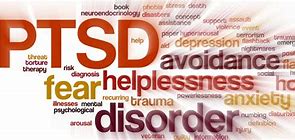
If you let the past weigh you down, life will come to a halt. Be free, seek help and be happy! Mental Health affects us all.

If you let the past weigh you down, life will come to a halt. Be free, seek help and be happy! Mental Health affects us all.

Post-traumatic stress disorder (PTSD) is an anxiety disorder caused by very stressful, frightening or distressing events.
Someone with PTSD often relives the traumatic event through nightmares and flashbacks, and may experience feelings of isolation, irritability and guilt.
They may also have problems sleeping, such as insomnia, and find concentrating difficult.
These symptoms are often severe and persistent enough to have a significant impact on the person's day-to-day life.
Any situation that a person finds traumatic can cause PTSD.
These can include:
PTSD can develop immediately after someone experiences a disturbing event, or it can occur weeks, months or even years later.
PTSD is estimated to affect about 1 in every 3 people who have a traumatic experience, but it's not clear exactly why some people develop the condition and others do not.
It's normal to experience upsetting and confusing thoughts after a traumatic event, but most people improve naturally over a few weeks.
You should see a GP if you or your child are still having problems about 4 weeks after the traumatic experience, or if the symptoms are particularly troublesome.
If necessary, your GP can refer you to mental health specialists for further assessment and treatment.
PTSD can be successfully treated, even when it develops many years after a traumatic event.
Treatment depends on the severity of symptoms and how soon they occur after the traumatic event.
Any of the following treatment options may be recommended:
You can refer yourself directly to a psychological therapies service.
People who repeatedly experience traumatic situations, such as severe neglect, abuse or violence, may be diagnosed with complex PTSD.
Complex PTSD can cause similar symptoms to PTSD and may not develop until years after the event.
It's often more severe if the trauma was experienced early in life, as this can affect a child's development.
You may have complex post-traumatic stress disorder (PTSD) if you have some of the symptoms of PTSD, and also have problems with managing your emotions and having relationships.
The symptoms of complex PTSD are similar to symptoms of PTSD, but may also include:
Complex PTSD may be caused by experiencing recurring or long-term traumatic events, for example:
You may also be more likely to develop complex PTSD if:
If you have complex PTSD, you may be offered therapies used to treat PTSD, such as trauma-focused cognitive behavioural therapy (CBT) or eye movement desensitisation and reprocessing (EMDR).
You'll also be offered treatment for other problems you may have, such as depression or alcohol addiction.
You should be offered ongoing support after your treatment ends.
The mental health charity Mind has more information about complex PTSD
Overview - Post-traumatic stress disorder - NHS (www.nhs.uk)
This blog might contain posts that are only visible to logged-in users, or where only logged-in users can comment. If you have an account on the system, please log in for full access.